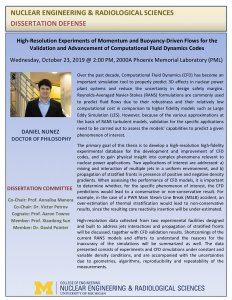Presented By: Nuclear Engineering & Radiological Sciences
PhD Defense: Daniel Nunez
High-Resolution Experiments of Momentum and Buoyancy-Driven Flows for the Validation and Advancement of Computational Fluid Dynamics Codes

Title: High-Resolution Experiments of Momentum and Buoyancy-Driven Flows for the Validation and Advancement of Computational Fluid Dynamics Codes
Abstract: Over the past decade, Computational Fluid Dynamics (CFD) has become an important simulation tool to properly predict 3D effects in nuclear power plant systems and reduce the uncertainty in design safety margins. Reynolds-Averaged Navier-Stokes (RANS) formulations are commonly used to predict fluid flows due to their robustness and their relatively low computational cost in comparison to higher fidelity models such as Large Eddy Simulation (LES). However, because of the various approximations at the basis of RANS turbulent models, validation for the specific applications need to be carried out to assess the models’ capabilities to predict a given phenomenon of interest.
The primary goal of this thesis is to develop a high-resolution high-fidelity experimental database for the development and improvement of CFD codes, and to gain physical insight into complex phenomena relevant to nuclear power applications. Two applications of interest are addressed: a) mixing and interaction of multiple jets in a uniform environment, and b) propagation of stratified fronts in presence of positive and negative density gradients. When assessing the performance of CFD models, it is important to determine whether, for the specific phenomenon of interest, the CFD predictions would lead to a conservative or non-conservative result. For example, in the case of a PWR Main Steam Line Break (MSLB) accident, an over-estimation of thermal stratification would lead to non-conservative results, since the resulting core reactivity insertion will be under-estimated.
High-resolution data collected from two experimental facilities designed and built to address jets interactions and propagation of stratified fronts will be discussed, together with CFD validation results. Shortcomings of the current RANS models and efforts to understand the reasons for the inaccuracy of the simulations will be summarized as well. The data presented consists of experiments and CFD simulations under constant and variable density conditions, and are accompanied with the uncertainties due to geometries, algorithms, reproducibility and repeatability of the measurements.
Chair(s): Prof. Annalisa Manera
Abstract: Over the past decade, Computational Fluid Dynamics (CFD) has become an important simulation tool to properly predict 3D effects in nuclear power plant systems and reduce the uncertainty in design safety margins. Reynolds-Averaged Navier-Stokes (RANS) formulations are commonly used to predict fluid flows due to their robustness and their relatively low computational cost in comparison to higher fidelity models such as Large Eddy Simulation (LES). However, because of the various approximations at the basis of RANS turbulent models, validation for the specific applications need to be carried out to assess the models’ capabilities to predict a given phenomenon of interest.
The primary goal of this thesis is to develop a high-resolution high-fidelity experimental database for the development and improvement of CFD codes, and to gain physical insight into complex phenomena relevant to nuclear power applications. Two applications of interest are addressed: a) mixing and interaction of multiple jets in a uniform environment, and b) propagation of stratified fronts in presence of positive and negative density gradients. When assessing the performance of CFD models, it is important to determine whether, for the specific phenomenon of interest, the CFD predictions would lead to a conservative or non-conservative result. For example, in the case of a PWR Main Steam Line Break (MSLB) accident, an over-estimation of thermal stratification would lead to non-conservative results, since the resulting core reactivity insertion will be under-estimated.
High-resolution data collected from two experimental facilities designed and built to address jets interactions and propagation of stratified fronts will be discussed, together with CFD validation results. Shortcomings of the current RANS models and efforts to understand the reasons for the inaccuracy of the simulations will be summarized as well. The data presented consists of experiments and CFD simulations under constant and variable density conditions, and are accompanied with the uncertainties due to geometries, algorithms, reproducibility and repeatability of the measurements.
Chair(s): Prof. Annalisa Manera